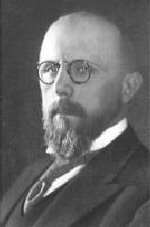Alexandre Galopin
| Alexandre Galopin | |
|---|---|
 Portrait of Alexandre Galopin | |
| Born |
Alexandre Marie Albert Galopin 26 September 1879 Ghent, East Flanders, Belgium |
| Died |
28 February 1944 (aged 64) Etterbeek, Brussels, Belgium |
| Nationality | Belgian |
| Occupation | Businessman |
| Known for | Galopin Doctrine |
Alexandre Galopin (26 September 1879 – 28 February 1944) was a Belgian businessman. He was director of the Société Générale de Belgique, a large Belgian company founded in 1822 by William I, and chairman of the board of the armaments company Fabrique Nationale d'Armes de Guerre. Galopin was behind the Galopin Doctrine, a "lesser evil" (moindre-mal) tactic that allowed industrial development in the occupied Belgium during World War II, under the auspices of the Belgian government in exile. In February 1944, he was murdered by Flemish collaborators from the DeVlag group.
Early career
Born to a university professor in Ghent on 28 September 1879, Galopin became in 1913 managing director of FN Herstal.[1] He championed its development into an important manufacturer of motor vehicles in Belgium. In 1935 he became governor of the Société Générale de Belgique (SGB), a giant holding company company with close ties to the Belgian government which dominated the economy of Belgium and its empire and controlled almost 40 percent of the country's industrial production.[2]
World War II
On 10 May 1940, Belgium was invaded by Nazi Germany. At the start of the German occupation, Galopin was made chairman of a committee, dubbed the "Galopin Committee", which brought together the leaders of Belgian holding companies, banks and industry. The committee had been set up by the Belgian government, shortly before it left the country, on 15 May 1940.[3][4][5] It served as a sort of a shadow government that decided economic and social policy and was able to set rules for dealing with the Nazi German occupiers. Albert-Edouard Janssen and Léon Bekaert were among its members.[3] Because of his power and influence within the Belgian wartime economy, he was nicknamed "the Uncrowned King of Belgium" by German occupation officials.[6]
Galopin Doctrine
Part of the goal of the Galopin Committee was to keep Belgian industry strong during the war so as to not leave the economy crippled once the war ended. Galopin pioneered a controversial policy, known as the "Galopin Doctrine". According to the doctrine, Belgian companies should continue producing goods for the Belgian civilian population (food, consumer goods etc.) under German occupation but should refuse to produce war materiel or goods for the German war effort.[7] The policy, dubbed the "politics of production", hoped to prevent a repeat of World War I, when the Allies had encouraged Belgian workers to passively resist the Germans by refusing to work.[8] The Germans instead deported Belgian workers and industrial machinery to German factories, benefitting their economy more.[8] The policy also hoped to avoid an industrial decline which would have negative effects on the country's recovery after the war; however, many viewed the policy as collaboration.[9] Between 1941 and 1942, the German authorities began to force Belgian businessmen to make an explicit choice between obeying the Doctrine (and refusing to produce war materials, at risk of death) and circumventing the doctrine as collaborators.[10] The cooperative approach did, however, prevent German companies from expanding their control over the Belgian economy.[11]
Galopin's policy was similar to the "cooperation" doctrine created in the occupied Netherlands by Max Hirschfeld.[12]
Assassination
Galopin was assassinated in 1944 by members of Devlag, a pro-Nazi Flemish paramilitary group, under the direct orders of Robert Jan Verbelen.[13] Galopin's name has been given to a street: avenue Alexandre Galopin in Etterbeek, Brussels.
See also
References
- ↑ Biographie Belge d'Outremer.
- ↑ Van den Wijngaert & Dujardin 2006, p. 33.
- 1 2 Mommen 2002, pp. 61-2.
- ↑ Grosbois 2007, pp. 245-67.
- ↑ Nefors 2006, p. 137.
- ↑ Mazower 2008, p. 268.
- ↑ Société Générale 1972, p. 147.
- 1 2 Société Générale 1972, p. 146.
- ↑ Van den Wijngaert & Dujardin 2006, p. 35.
- ↑ Van den Wijngaert & Dujardin 2006, p. 36.
- ↑ Mazower 2008, pp. 268-9.
- ↑ Mazower 2008, p. 269.
- ↑ Gildea, Wieviorka & Warring 2006, p. 45.
Bibliography
- Van den Wijngaert, Mark; Dujardin, Vincent (2006). La Belgique sans Roi, 1940–1950. Nouvelle Histoire de Belgique, 1905–1950. 2. Brussels: Éd. Complexe. ISBN 2-8048-0078-4.
- Mazower, Mark (2008). Hitler's Empire: Nazi Rule in Occupied Europe (1st ed.). London: Allen Lane. ISBN 978-0-713-99681-4.
- Mommen, André (2002). The Belgian Economy in the Twentieth Century. Routledge. ISBN 978-0-203-40348-8.
- La Société Générale de Belgique, 1822–1972. Brussels: Société Générale. 1972.
- Grosbois, Thierry (2007). "Les relations avec la Belgique occupée". Pierlot, 1930-1950 (in French). Lannoo Uitgeverij. ISBN 978-2-87386-485-9.
- Nefors, Patrick (2006). "La reprise industrielle (mai - septembre 1940)". La collaboration industrielle en Belgique, 1940-1945 (in French). Lannoo Uitgeverij. ISBN 978-2-87386-479-8.
- Gildea, Robert; Wieviorka, Olivier; Warring, Anette (2006). Surviving Hitler and Mussolini: Daily Life in Occupied Europe. Berg. ISBN 978-1-84520-181-4.
- "Galopin, Alexandre Marie Albert". Biographie Belge d'Outremer (PDF) (in French). IV. Royal Academy for Overseas Sciences. 1968. p. 383.
Further reading
- Van den Wijngaert, Mark (1990). L'Économie belge sous l'Occupation: La Politique d'Alexandre Galopin, Gouverneur de la Société Générale (PDF) (in French). Paris: Duculot. ISBN 9782801109441.